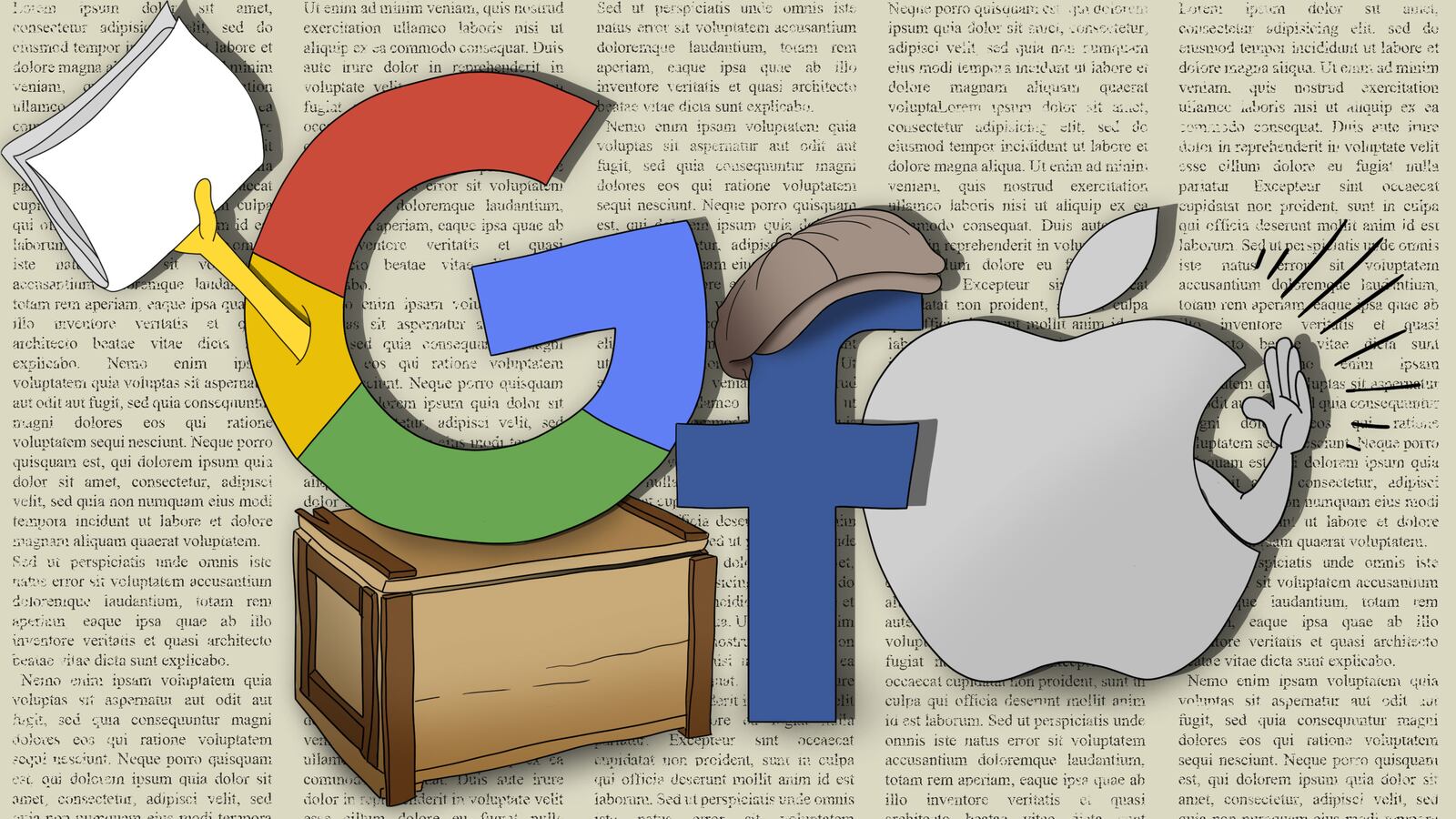Every week in America seems to bring another newsroom closure, or another announcement of journalist layoffs.
For months we’ve watched and waited as Congress and other parts of the federal government have pressed Google, Apple, Facebook, and other titans of the digital age on their increasingly monopolistic control of internet advertising revenue. We’ve hoped the pressure might convince them to release the stranglehold on the news business that’s cost us more than 7,200 jobs this year alone and forced venerable institutions like the New Orleans Times-Picayune to shut down.
There is no longer any doubt that the rapidly shrinking share of ad revenue that news publishers have taken in over the last decade—despite increasing readerships in many cases—has caused a fundamental crisis in the news industry.
And it’s now equally clear that Google and Facebook, which have taken the advertising dollars that once supported the press, aren’t going to voluntarily make the changes that would be necessary to save the news industry. Facebook’s “News tab,” which the company announced as CEO Mark Zuckerberg was being grilled on Capitol Hill for greenlighting false political ads, pays some national outlets for their partnership, but does nothing for the many less prominent local newspapers and digital outlets the company is squeezing out of the ad market.
And recently, Google not only rejected calls by French news outlets to compensate them for aggregating their stories in its newsfeed but also demanded that it be allowed to use summaries of stories and pictures for free, if outlets wanted their stories to appear in searches online. Earlier this year, Google announced that it was changing how its incognito mode would function in its Chrome browser, which has 65 percent of the browser market, in a way that would make it much harder for publishers to enforce subscription limits. News publishers are at the mercy of these kinds of unilateral changes to browsers and other platforms. At BuzzFeed and HuffPost, we saw the impact of these changes firsthand. The views on our news videos were climbing every day, until they abruptly dropped. Facebook, without warning, changed its algorithm, meaning our audience and revenue plummeted as well. We spent weeks focusing on deciphering the new algorithm, instead of focusing on reporting news. As it turns out, Facebook inflated those views by as much as 900 percent. We were chasing ghosts, courtesy of Facebook.
Like John D. Rockefeller and Andrew Carnegie before them, today’s digital robber barons view themselves as above the law and consider their pursuit of profits to be sacrosanct. When presented with clear evidence of the damage their avarice has wrought, they’ve followed a familiar playbook—deflect, deny, throw a few tax-deductible pennies towards the problem they created, and call it a day.
This crisis didn’t happen overnight, and there is no easy way to fix it. But what’s clear is that Congress and the federal government are overdue to act. While ongoing investigations by congressional committees, the Department of Justice, and the Federal Trade Commission are a start, more is needed. Congress should immediately take up the Journalism Competition and Preservation Act to provide companies with antitrust protections in order to collectively bargain with these tech companies for better advertising revenues and end the liability carve-out for aggregating platforms to level the playing field with news publishers.
We have a long tradition in this country of regulating privately controlled infrastructure, like our railways and telephone lines, and it’s time to take a similar approach to web browsers and other content platforms, which have become de facto parts of the public square. The browser is the gateway on which so much commerce depends, and the tech giants now unilaterally set the terms of its use. For news publishers, that means they have limited control over reader access to their own content and reduced opportunities to monetize it. And it gives the tech giants outsized influence over the basic dissemination of information to the public.
Regulation of the browser or other platforms would not mean the companies that own them couldn’t make changes or improvements. It simply means that those changes would have to be reviewed in advance to ensure that they do not unfairly harm competition or threaten the extinction of whole industries.
Our industry is the only business given explicit protections under the Constitution, a recognition of the importance of an independent, vibrant press to the proper working of a democracy. But to preserve democracy, we must first keep the lights on in our newsrooms.







